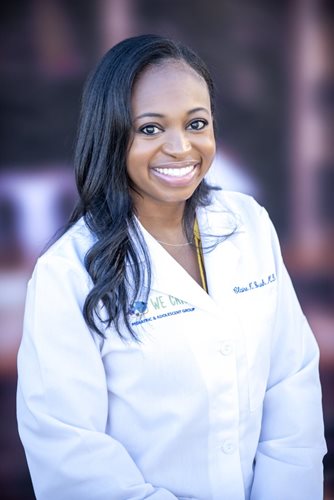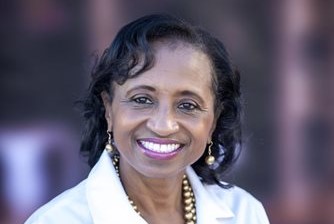In the bustling community of East Point, Georgia, Dr. Claire Bush carries forward a legacy of pediatric care that spans nearly a quarter century. A Howard University Summa Cum Laude graduate and George Washington University School of Medicine alumna, Dr. Bush joined her mother’s practice, We Care Pediatrics, in 2015. Now, as both a board-certified pediatrician and mother of two, she brings a unique dual perspective to children’s healthcare. In a revealing conversation with Justin VanNoy for Rolling Out Health IQ, Dr. Bush shares insights on modern parenting challenges, childhood health trends, and the delicate balance between professional expertise and personal experience.
[Editor’s note: This is a truncated transcription of a longer video interview. Please see the video for the extended version. Some errors may occur.]
What trends are you noticing in child health and pediatrics?
Well, there’s lots of things. We see kids from birth up until 21, so it depends largely on the age. In the newborn period, there’s a lot of questions, concerns, obviously with new parents. Is this normal? Is this not normal? Should I be concerned? So, we do a lot of reassurance around that, and obviously if we do identify anything concerning with development, growth, any type of medical conditions, then we go over that.
As kids get older, we’re seeing a lot of childhood obesity, sometimes starting in toddlerhood, really worsening in school-age kids. So, we’re tackling healthy habits, developing healthy habits, changing things that have been ingrained in families and generations about eating and exercising. As kids get older into teenagehood, we’re seeing more risky behaviors, which have changed over time. So nowadays, we’re seeing a lot of marijuana use, a lot of vaping, some early childhood or early adolescent drinking behaviors, sexual behaviors. So, we’re doing a lot of education surrounding those things, making good decisions, avoiding risky behaviors. And then we see kids up until 21, so we’re seeing them into adulthood and how to manage the things that come along with adulthood in your health. Your parents aren’t there to tell you what to do, so you have to make these healthy decisions on your own. So, we see that into adolescence and early adulthood.
How can mothers maintain healthy eating habits when their children are exposed to unhealthy options?
So, we start to teach kids at an early age what foods fuel your body. So, what things do you want to put into your body? You want to put lots of nutrients, you want to put lots of good vitamins. Why are these vitamins important? They’re important for your immune system, for your bone growth. And then we start to teach them what foods will give you those nutrients and what foods should be more limited to special occasions, to treat items.
What are your thoughts on exercise and when should families start introducing healthy exercise habits?
A: Yeah, so exercise should start as soon as a child can move. And it doesn’t have to be exercise; it could be activity. And so fun activities, part of school is recess and PE. So, we want to encourage those. We want to encourage families to exercise together, so you’re taking a bike ride, you’re taking a hike, you’re encouraging your kids to play in organized sports if you can. So, we always want to develop an active lifestyle, and it doesn’t have to be exercise. You don’t have to do 100 push-ups a day and sit-ups and run in place, but just where you can be active, you want to be active. And parents should model that for their kids, right? So instead of complaining about the long walk to the door from the car, we’re going to take this as an opportunity to stay active. Parents should model healthy habits at all times, whether that’s eating or exercising, because kids learn most from emulating those around them. And it’s better to show them than to tell them. So, we want to be active as soon as a child can move, and you want to make that part of their daily life and activity and routines.
What are your thoughts on immunizations and vaccines for children?
Yeah, you bring up a good point. Parents are faced with a lot of decisions, and they have a lot of information coming from them, whether that be from friends, from family, from social media, from their pediatrician. And they’re navigating how to make the best decision for their kids, and a lot of parents really find it stressful when thinking about vaccines. There are lots of vaccines out there, and we recognize that. We do believe in vaccines, how effective they can be in preventing life-threatening illnesses.
We’ve seen that time and time again, that we are no longer seeing diseases that we previously seen because of how effective vaccines are. And so, we do recommend vaccines, and we go according to the CDC schedule for vaccines. We encourage our families to vaccinate. But we do encounter vaccine hesitancy, where parents are hesitant to do vaccines. They don’t want to do certain vaccines. Maybe they’ve heard that this vaccine is linked to this disease, or they had someone who they feel had a negative side effect of a vaccine.
And we try to always stay evidence-based. And so, we tell them what the studies have shown, what evidence has shown over time as far as these vaccines. In our practice, we do sometimes work with parents who are interested in an alternate vaccine schedule, which is not something that we recommend. But at the end of the day, it is the parents’ decision. And we, although we feel strongly about vaccines, we try to work with everyone in order to ultimately get them vaccinated, even if that’s with a delayed schedule.
As both a mother and pediatrician, how does this dual perspective influence your practice?
I think being a mother definitely makes me a more compassionate pediatrician. I know more of the struggles that mothers and parents go through, whether that’s just the worry that you have about your kid, especially when you don’t know what’s going on because a kid can’t necessarily tell you.
So that comes with a lot of worry. I know the struggles between what is, yes, textbook what we recommend and what’s actually feasible in real life sometimes. Sometimes you have to balance the stressors of life, whether that be work, school, and maybe you can’t necessarily live the ideal life as far as healthy eating every single day or limiting the screen time every single day. And we know that these are goals and these are things that we encourage and that we strive for. But every day may not be a perfect day. And so, we try to be as compassionate as we can, especially being a mother.
What differences have you noticed between raising boys and girls?
That’s a good question, and I feel like every child is different. I think sometimes people want to make generalities like, oh, a daughter is like this and a son’s like this, or a girl is going to behave in this manner, and a boy is going to behave in this manner. And that’s not always the case. Every child is different. You may have that boy that is very active and is very hands-on and is very physical, but you may also have that boy who’s not, and he is a calmer child who doesn’t feel the need for the level of physical activity that some other boys do.
What would you ask the community, especially parents of children of color, to do better?
I would say learn the resources that you have around you. As a pediatrician, I hope to be a resource to my families. I hope to be part of the village that raises a child. And I think that it’s important to decipher the good information from the bad information. With social media, you’re getting a lot of information. It’s not always good information. So, learn the resources that are around you that are trusted, that even if you see something, you can ask a valid source, you know, is this good? Is this not good? And as a pediatrician, we always try to be non-judgmental. But we definitely want to be a good evidence-based resource for our families to help decipher all the information that you’re getting because it’s not always good information.
As a pediatrician deeply rooted in the Atlanta community, Dr. Claire Bush brings a compassionate, evidence-based approach to children’s healthcare. Her insights reflect the complex challenges facing modern parents, from navigating healthy habits in a world of processed foods to making informed decisions about vaccines amid widespread misinformation. By combining her professional expertise as pediatrician with personal experience as a mother, Dr. Bush emphasizes the importance of building a strong foundation for children’s health while acknowledging the real-world challenges parents face when it comes to pediatric health.
Her message is clear: successful childhood healthcare requires a village of trusted resources, evidence-based information, and understanding pediatric healthcare providers who can guide families through the journey from infancy to early adulthood. Through this balanced approach, Dr. Bush and We Care Pediatrics continue to serve as vital resources for Atlanta families seeking to raise healthier children in today’s challenging environment.
This interview was conducted by Justin VanNoy in partnership with Rolling Out Health IQ, bringing essential healthcare insights to communities that need them most.














